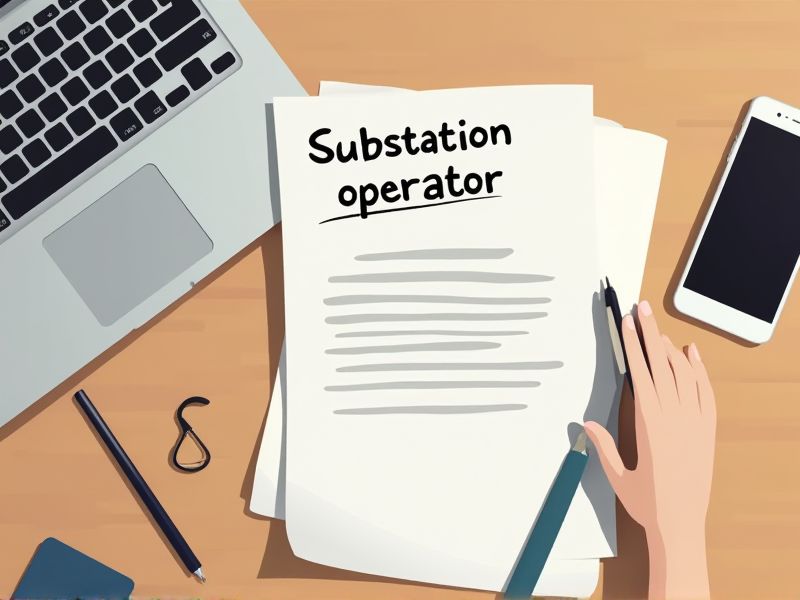
Substation operators play a critical role in ensuring the reliable distribution of electricity. Due to the complexity and high-risk nature of handling high-voltage equipment, certain certifications are essential to meet safety and technical standards. These certifications provide operators with vital knowledge of power systems, emergency protocols, and regulatory compliance. Below are some key certifications required for a substation operator.
Substation Operator Certification
Substation Operator Certification ensures that operators possess the necessary knowledge and skills to safely manage and maintain electrical substations. The certification process enhances reliability and safety by standardizing practices across the industry. Properly trained operators help reduce the likelihood of errors that could lead to outages or equipment failures. Certification also validates an operator's proficiency, which helps in maintaining industry standards and compliance with regulatory requirements.
NERC Critical Infrastructure Protection (CIP) Certification
The NERC Critical Infrastructure Protection (CIP) Certification is necessary for substation operators to ensure they are equipped to safeguard critical components of the electric grid against cyber threats. Achieving this certification demonstrates an operator's capability to implement essential security controls, which lowers the risk of unauthorized access and potential disruptions. Regulatory compliance with NERC standards is mandatory, and certification confirms an operator's adherence to these requirements, promoting operational reliability. Improved security practices fostered through the certification process can reduce the likelihood of financial penalties associated with non-compliance.
NERC Reliability Coordinator Training
NERC Reliability Coordinator Training equips substation operators with crucial skills for maintaining grid stability, which directly affects power system reliability. Training ensures compliance with NERC standards, reducing the likelihood of violations and potential fines. Operators enhance decision-making capabilities during emergencies, minimizing downtime and impacts on the power grid. Training fosters consistent communication across various teams, leading to more efficient and coordinated power system management.
Electrical Safety Compliance Certification (NFPA 70E)
Electrical Safety Compliance Certification (NFPA 70E) safeguards substation operators from electrical hazards, reducing the risk of injury. Compliance ensures that operators are trained in safe work practices, which decreases the likelihood of accidents. Certified operators contribute to a safer work environment, improving overall operational efficiency. Regulatory bodies often require certification to meet industry standards, impacting a company's compliance status.
OSHA 30-Hour General Industry Certification
The OSHA 30-Hour General Industry Certification equips substation operators with essential safety skills and knowledge, significantly reducing workplace accidents and injuries. Compliance with OSHA guidelines is mandated by law for many industries, ensuring that operators adhere to standardized safety protocols. Enhanced awareness of potential hazards from the certification process allows substation operators to implement proactive strategies for mitigating risks. Possessing this certification often makes candidates more attractive to employers, indicating a commitment to maintaining a safe working environment.
Arc Flash Hazard Awareness Certification
Substation operators with Arc Flash Hazard Awareness Certification are equipped to understand and mitigate the risks associated with high-energy electrical discharges. Understanding arc flash hazards results in improved safety protocols that protect both personnel and equipment. Compliance with safety standards and regulations enhances the operational efficiency and reduces potential legal liabilities for substation facilities. Informed operators can effectively respond to emergencies, minimizing downtime and ensuring continued power supply.
Confined Space Entry Certification
Confined space entry certification for substation operators is required because it equips them with the knowledge to identify and mitigate potential hazards, such as toxic gases or low oxygen levels, within enclosed environments. This certification ensures they understand and adhere to safety protocols that significantly reduce the risk of accidents and injuries. Regulatory compliance mandates such training to uphold workplace safety standards and avoid legal ramifications. Proper certification enhances operational efficiency by preparing operators to perform their tasks safely and effectively in confined spaces.
SCADA/EMS System Operation Certification
SCADA/EMS System Operation Certification equips substation operators with the necessary skills to effectively manage the complexities of modern power grids. Certified operators demonstrate a clear understanding of real-time data monitoring, which directly enhances the reliability and efficiency of energy distribution. This certification ensures compliance with industry standards, reducing the likelihood of operational errors and unplanned outages. Moreover, certified operators can swiftly respond to anomalies, minimizing risks and ensuring a stable power supply.
Emergency Response and Incident Management Certification
Emergency Response and Incident Management Certification equips a substation operator with essential skills to effectively handle critical situations, minimizing operational downtime. It provides them with a structured approach to assess risks, enabling swift and efficient decision-making during power disruptions. The certification ensures compliance with industry standards, reducing potential liabilities and enhancing workplace safety. This credential reinforces an operator's capability to coordinate with first responders and internal teams, ensuring a comprehensive response to emergencies.
First Aid & CPR Certification
Substation operators work in environments with high voltage and electrical machinery where accidents can lead to severe injuries, making first aid certification crucial for immediate on-site response. The presence of CPR knowledge is essential as it increases the chances of survival in cardiac emergencies often caused by electrical shocks. Quick and informed action during medical emergencies can mitigate the severity of injuries, reducing downtime and ensuring operational continuity. Safety regulations and industry standards often mandate such certifications to maintain a secure working environment and address potential liabilities.
Summary
When you, as a substation operator, obtain certifications, your professional skills and knowledge become validated, enhancing your career prospects. Employers view certified operators as more competent and reliable, increasing your chances of gaining promotions or advanced positions. Your workplace safety awareness and operational efficiency are likely to improve, reducing risks and operational downtime. As a result, both your credibility and the overall functionality of the substation's operations are expected to see significant positive impacts.
